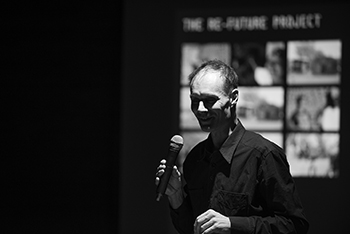Latest News Archive
Please select Category, Year, and then Month to display items
12 January 2024
|
Story Nonsindiswe Qwabe
|
Photo Sonia Small
 Since joining the UFS in 2008, Dr Grey Magaiza has worked extensively on approaches that can foster the socio-economic transformation of societies.
Since joining the UFS in 2008, Dr Grey Magaiza has worked extensively on approaches that can foster the socio-economic transformation of societies.
“The future should be one where communities can decide on their development agenda and futures. That’s the most important for me.” Dr Grey Magaiza, Deputy Director of the Centre for Gender and Africa Studies (CGAS) and Head of the Community Development programme on the Qwaqwa Campus, is passionate about capacitating communities to be agents of change and advancement. His vision for the future emphasises the empowerment of communities to take charge of their development by actively participating in decision making and the implementation of development projects that can improve their lives.
Since joining the UFS in 2008, Dr Magaiza has worked extensively on approaches that can foster the socio-economic transformation of societies. Over the years, he has crafted his research speciality into one that he is most proud of – being an interdisciplinary scientist immersed in the development of communities.
“I’m in a fortunate position of researching what I like. I say ‘fortunate’, because I’ve taken the time to understand what I’m passionate about, which is the overall field of rural livelihoods and livelihood futures – in short, community development. My research starts from an engaged university, understanding the elements that a university must use to enhance transformation and relevance to its immediate community in terms of development.”
One of the ways he has done this is by looking at social entrepreneurship as a development approach for young people in a rural setting. Through workshops with non-profit and civic organisations in Qwaqwa, Dr Magaiza has been helping these organisations to map out their needs and actively meet them through the involvement and support of external role players.
“We understand that communities are part of the national development agenda, but even that national agenda respects community knowledge and intentions and allows communities to shape their identity. A critical enabler of this is community organising. You bring back the capacity in communities to have dialogues on issues affecting them as spaces for engagement, knowledge exchange, and for people to just talk about their way forward.”
By enabling communities to define their development agenda, they can address their specific needs, challenges, and aspirations, he said. “When I look at livelihood futures, it’s quite an exciting aspect of my work – it’s like looking into a fortune tellers’ globe, because you’re not deciding for communities what they should do, but the communities themselves take those decisions.”
Arts and Science collaborate in creating sustainable futures
2016-03-16

Creating a future where living green is the status quo: Dr Keith Armstrong
Photo: Lihlumelo Toyana
|
In creating partnerships across disciplines, mankind gains a deeper understanding of how to create the future. This is the premise upon which Dr Keith Armstrong bases his research and experimental art. Dr Armstrong is an Australian Hybrid Media artist and a Senior Research Fellow at Queensland University of Technology in Australia.
Artists that make things happen
“My journey has shifted from an artist that makes things to an artist that makes things happen,” he said at the New Futures: Innovations in Arts and Science public talk recently at Oliewenhuis Art Museum. The talk, organised by the Johannes Stegmann Art Gallery, was part of a series of artistic projects presented by the Programme for Innovation in Arts and Development (PIAD). This initiative is spearheaded by the UFS and Vrystaat Arts Festival, kindly supported by The Andrew W. Mellon Foundation.
Dr Angus Hervey – an Australian writer, technologist and science communicator– was also a speaker at the event. Dr Hervey is a co-founder of Future Crunch, a platform for intelligent, optimistic thinking about the future. He strongly shares Dr Armstrong’s passion and viewpoints.
Dr Armstrong’s work is motivated by social and ecological justice. His non-traditional research and more than 60 artworks serve to evoke audiences to create sustainable futures.
Building the future
Dr Armstrong is in the process of making “things happen” in informal settlements across the Free State by means of his Re-Future project. The project brings together sustainability, community development, and creative action. It moves away from conventional art practices and instead offer a platform to rethink and therefore re-future our practices of sustainability.
The Re-Future project has been initiated through a collaboration between the Johannes Stegmann Art Gallery, the UFS Centre for Development Support (CDS) and Qala Phelang Tala (QPT) and the Vrystaat Art Festival.
According to Anita Venter, a lecturer at CDS and founder of QPT, empowerment is at the centre of the artist-initiated, yet community-controlled project. “It gives a new direction and new hope to the community,” she said.
For more information
Angela de Jesus, dejesusav@ufs.ac.za or +27(0)51 401 2706